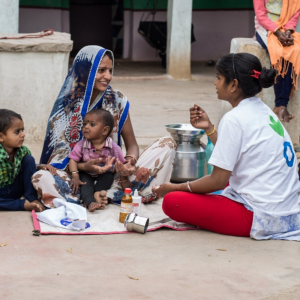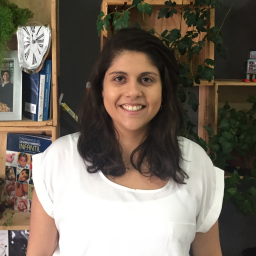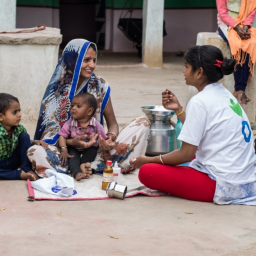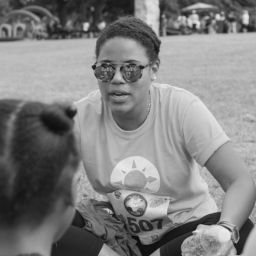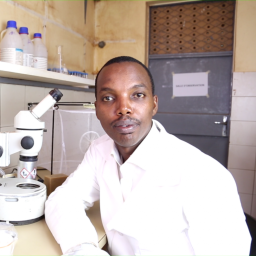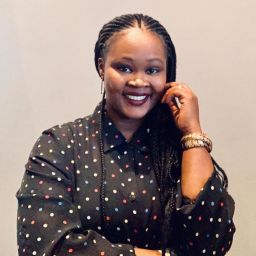Meaningful Business (MB:) Tell us a little bit about your journey with depression, and how it started.
Noelle Forde (NF): In August 2014, I gave birth to our beautiful daughter. The first couple of months were tough and, as I’m sure every mother will agree, I found myself to be a bit of a robot going through the routine and functions of being a mum but not feeling like I was. From there it all went downhill. I was struggling to cope with the daily functions and I started to isolate myself from my family and friends. I was constantly crying, and my mind was always on overdrive, with guilt, sadness and a fog that wouldn’t go away. I started faking my happiness, putting on a mask and pretending that everything was okay.
The sadness, lack of connection with my daughter, guilt, desperation and despair had consumed me. I felt like the worst mother in the world and so I decided to pack my bags and leave my husband and daughter as I felt they would be so much better off without me.
MB: How did you decide to seek help?
NF: When I decided to leave, I explained to my husband that I couldn’t pretend for the rest of my life that I was happy. On New Year’s Eve 2014, my husband arranged for me to see my doctor. As soon as I entered the doctor’s office and closed the door, I just started crying and didn’t say a word. From that point I knew I needed help and could not keep going the way I was.
I was physically and emotionally exhausted. That day I felt like someone had lifted 10,000 tons of concrete off my shoulders – I felt I could stand up straight a bit more. I knew I had a long way to go but it was a start.
MB: What are the coping mechanisms you have learnt and still use today?
NF: I learnt a lot over the following years about myself – understanding what I was going through and why, as well as finding the best tools that worked for me and positive ways to help myself.
Counselling helped me understand the feelings of sadness, anger, guilt and isolation. The medication really helped remove the fog and helped me focus and find balance.
Talking was what worked best of all. The counselling gave me the confidence and strength to speak openly to my family and friends about what I had been going through. I found the more I talked about it, the better I felt.
Another great thing I learned was asking for help. It does not reflect badly on a person, and admitting you need help is courageous and honest. Even now, if someone offers to help me I say thank you and grab it with both hands!
Life can be busy with children, working full time and fitting everything else in, so I make sure I take time for myself. I know if I don’t look after myself I cannot look after and love anyone else.
MB: In the current pandemic, how have you coped with the lack of separation between home and work, and balancing all of your responsibilities in both settings?
NF: Juggling a work/life balance has been brought to a whole new level for a lot of people, including myself. When I’m at work I am 100% focused on my work and striving to achieve my career goals. When I am at home I am 100% mum and wife, focused on my personal life. I am usually very good at separating both and focussing on what’s important at that time. When these two worlds collided during lock down, I found I was not able to give 100% to work and 100% to my family and that really impacted me – I was trying to do it all and failing!
The first month or so I struggled to balance it all. In April I took a step back, used the tools and experience I had and looked at what was happening.
I started talking to friends and work colleagues in similar situations to me and they were in the same boat. I accepted I could not do it all and so I didn’t – I did my best both professionally and personally and that was enough.
I gave myself a break, stopped being so hard on myself and started again to look after myself more in terms of sleep, activities and wellbeing.
MB: What is your advice to other mothers who are going through similar difficulties?
NF: When I became a Tackle Your Feelings Ambassador and started sharing my journey, many women approached me and said that it resonated so much with them. There are far too many women in this world who feel they have to hide their struggles, believing that it is a form of weakness and it will have a negative impact on them, personally or professionally, if they admit it or seek help.
Having gone through such a journey and come out the other side, I felt more determined to show women it is okay to struggle, recognise the signs, admit to yourself that you have those symptoms and get the support you need.
Never be afraid to reach out and ask for help, no matter what that help may be and never turn away an offer to receive help. Sometimes you cannot do it all yourself and that is okay. So take the help, take the support, take care of yourself!
MB: What can companies do to support parents who are going through mental health challenges, and create a safe space for them to talk about it openly and/or seek help?
NF: There are so many things happening now to support parent wellbeing and it’s great to see.
A support programme for families is a fantastic tool for both employers and employees. For having that parental support before, during and after pregnancy really does make a significant difference to the employee.
For every employee to understand and see the importance of wellbeing, it is important that leaders and managers talk or create awareness about it at a local level.
For me a company has to have an open and understanding culture, and a good wellbeing programme in place that encourages employees to be open, honest and supportive of each other.
END.
Watch Noelle share her story of postnatal depression and recovery in the video below.
You can now watch the MindMatters digital event, discussing how to prioritise the mental wellbeing of you and your teams, in partnership with Z Zurich Foundation, here.





